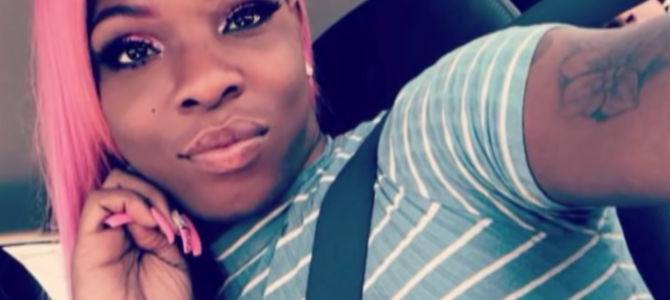
For the last several years, it has become common to see headlines sounding the alarm that violence against transgender people is at crisis levels. This is especially true of men living as women who aren’t white. Each year we see rolling counts of how many transgender people have been murdered “so far” this year.
The issue has become a rite of passage for Democratic presidential candidates and was featured in the recent Democratic debates focusing on LGBTQ issues. When asked what she planned to do for LGBTQ Americans during her first 100 days in office, Sen. Elizabeth Warren answered by reading the names of several transgender people reported as murdered. Warren concluded, “It is time for a president of the United States of America to say their names.”
What Happened to Muhlaysia Booker?
One name that has become a prominent representation of the reported crisis is Muhlaysia Booker. In April 2019, Booker became a celebrated activist after a video of a group of people brutally beating Booker was widely shared on social media. A month later, Booker was found shot to death on a street in Dallas, Texas.
On Oct. 4, 2019, ABC News tweeted out a “Nightline” profile of Booker’s story with a video of friends and family sharing memories. It also included a brief clip of the beating without context. To the observer, it appears Booker was targeted for mob violence and then murdered because Booker was a transgender person.
The details behind the beating do not support this portrayal, however. In April, Booker accidentally backed into another car, and the driver drove Booker off the road in an attempt to prevent Booker from fleeing. According to Booker, the other driver pointed a gun at Booker and demanded payment for the damage to his car before he would allow Booker to leave. A crowd gathered around the altercation, and an unidentified person offered Edward Dominic Thomas, 29, $200 to beat Booker.
The video of the incident shows multiple men violently attacking Booker as a large crowd surrounds them, shouting and cheering. Although Out Magazine indicated the video shows bystanders hurling homophobic and misogynistic slurs and Booker reported the attackers used homophobic slurs, the video did not clearly indicate it, nor did the police confirm it. During an interview with police, Thomas admitted to the assault but claimed not to have engaged in any derogatory language toward the victim. Thomas has since been arrested and is awaiting trial for the assault.
Police arrested Booker’s possible murderer in connection with a string of other murders in the area. CBS News referred to the accused as a serial killer. According to Dallas police, Kendrell Lavar Lyles, 34, was known to frequent an area where transgender people sell sex. On May 18, 2019, three hours before her death, witnesses say Booker got into Lyles’ car on this street.
Lyles was already charged for two other murders when police made the connection thanks to his possession of Booker’s cell phone. He is believed to have murdered three people during the month of May, including one woman he knew personally and a woman he planned to sell illegal drugs to via facebook. A second transgender person was reported as his fourth victim, but police have now determined that person committed suicide.
Dishonesty About Transgender Victims
Another woman was murdered in the same area about the same time, after being stabbed multiple times, and in October, a gay man in drag, who was incorrectly identified by police as a transgender woman, was found fatally shot in a parked car. The young man, Traylon Brown, preferred to go out in drag to pick up men, and his mother believes his murder was the result of a burglary and not “hate.”
Booker’s family also said they do not believe Booker was targeted for being transgender. Booker’s aunt told local reporters she believes police are simply trying to “satisfy” the public with these connections but she thinks the murder was over a personal dispute.
High-profile and LGBT advocacy media have not reported any of these details, nor the context of the local area in which multiple unrelated murders have recently occurred. The fact that Booker was initially the victim of a road rage incident in which a career criminal held Booker at gunpoint and then he and his group publicly beat Booker over a fender-bender, and the fact that Booker was then murdered by a likely serial killer targeting the area Booker worked in, seem irrelevant to the narrative. But Booker’s story tells us a great deal about the threat of gang and drug violence in urban areas and the high risks of prostitutio, but it tells us nothing about any specific threat to transgender women, of color or otherwise.
When Warren expressed a need for political leaders to “say the names” of transgender victims, the symbolic action strengthened the idea that, as ABC News puts it, “Saying their names out loud served as a larger call for attention and action to an issue that largely goes underreported.” The Human Rights Campaign reported 145 murders of transgender people since 2013 but lamented the violence is “hard to track due to misgendering — incorrectly applying gender labels — and transphobia.”
Sen. Cory Booker, D-N.J., has specifically called for trans-specific protections to address the issue. But a look at news reporting betrays this notion. Since the initial assault, Muhlaysia Booker has been cited nearly 350 times in world media. The judge in the upcoming trail of Thomas, the man accused of beating Booker in the traffic incident, specifically required the use of the victim’s preferred name rather than Booker’s birth name. The primary concern was ensuring the jury did not view the incident as a “fight between two men” but rather as a man beating a woman.
In the effort to force an emotional narrative that simply refuses to be true, LGBT advocacy and the media place the vulnerable lives they seek to bring awareness to in more danger. The media’s focus on the racial attributes of the victims, as ABC News did, saying, “Trans women of color particularly are at steep risk of marginalization, violence, and erasure,” further diminishes the issue. The assumption is that nonwhite trans people are more often targeted because of their race when, in fact, the known assailants largely share their racial attributes. They have given us nothing to “act” against.
Democrats’ Transgender Narrative Is Political Marketing
What trans-specific protections would have saved Booker’s life? Vox even articulated this concern by arguing policies that remove sex work online force prostitutes onto the streets, where they are in far more physical danger. The threat is environmental, not social.
The only reason Booker’s name is so well known compared to the other people her alleged killer also allegedly murdered is Booker’s usefulness to the current LGBT message of fear and panic. Sadly, Booker’s own life choices, environment, and the truth seem far less interesting to advocacy groups who feel entitled to exploit Booker’s life for political marketing.
The ongoing reporting of transgender murders as a collective pattern of hatred and targeted violence is a powerful tool the Democratic Party is using to emotionally manipulate voters into believing they alone can somehow protect vulnerable Americans. But the truth is absolutely nothing can be done that is not already in place that would specifically protect transgender people from the same violence women face in dangerous environments related to domestic abuse, sex work, drugs, or living in high-crime areas.
This violence is not somehow more of a critical issue when it happens to a person who is also transgender. Diminishing the lives of non-transgender victims does nothing to further the cause of equality. Neither does manipulating the facts to make the public believe there is a specific threat that one political party exaggerates and the other resolves.
The lives of these victims will never be honored as long as they are exploited for a false narrative only used to spread fear and hatred. Saying their names to bring awareness to the true violence at hand is positive. Doing so to perpetuate a lie is cruel.









